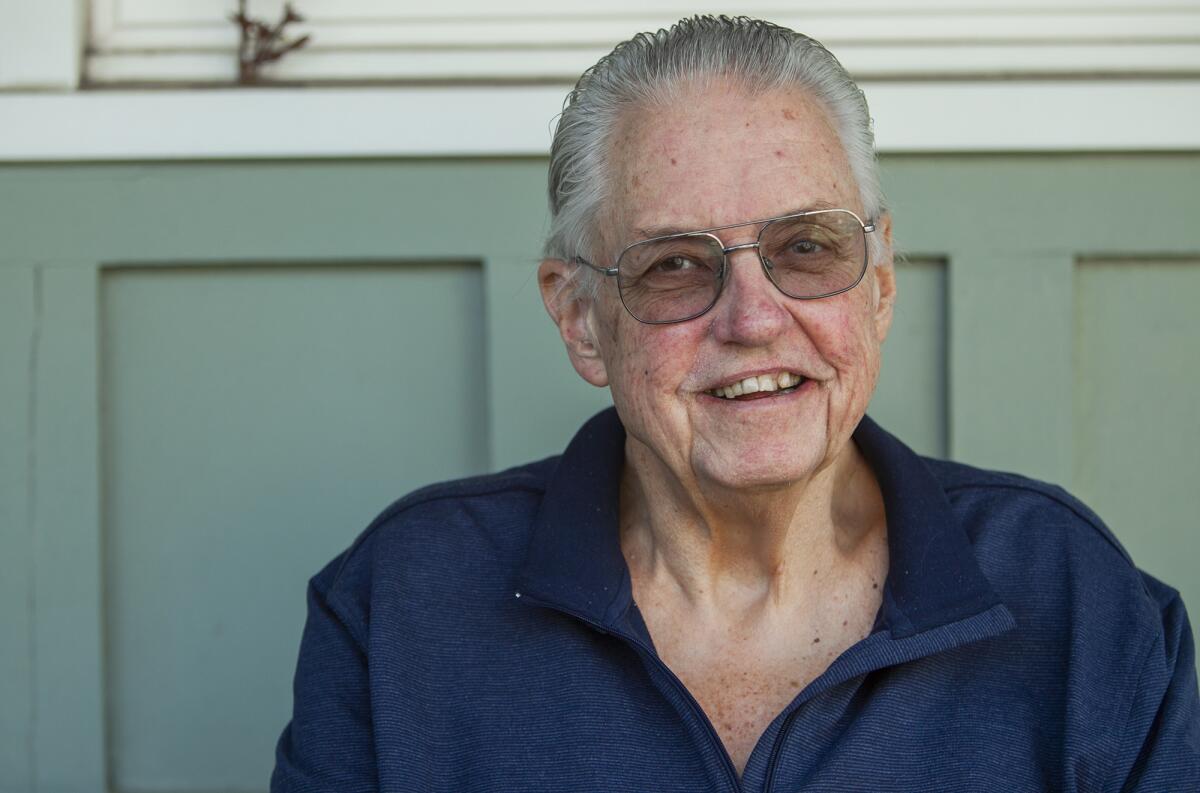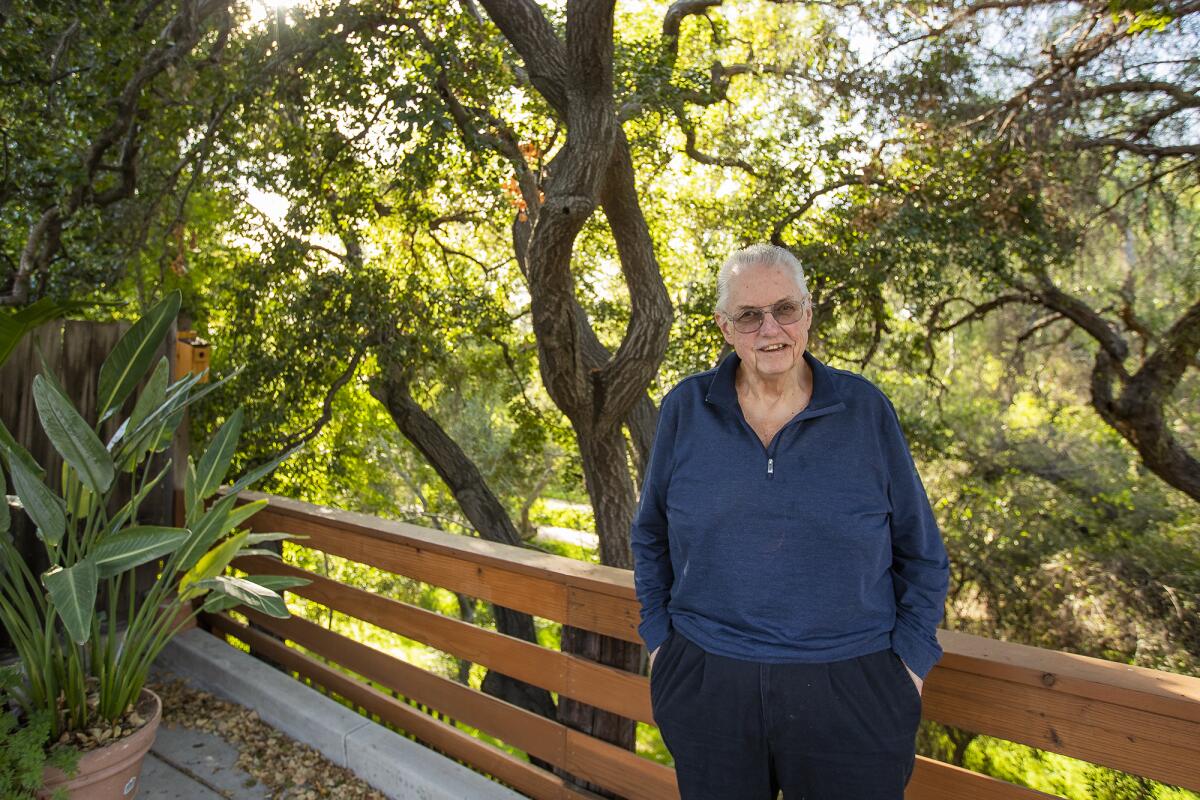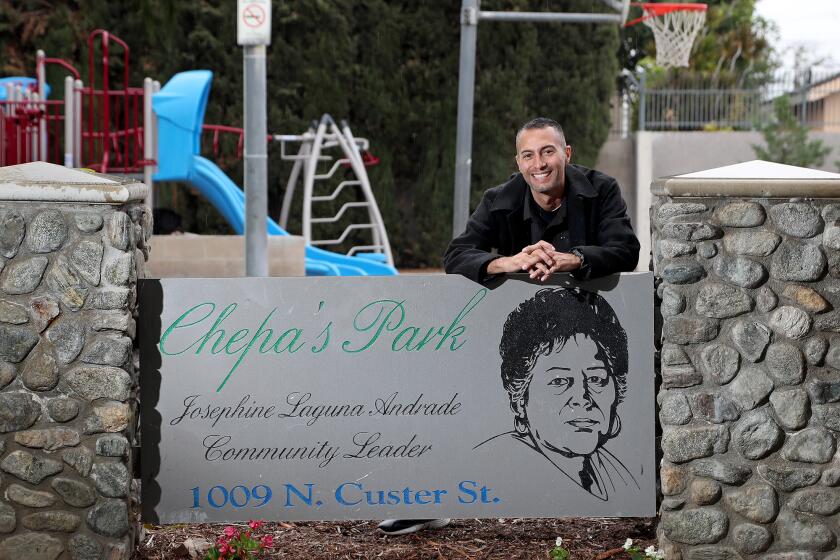Mike Clements, veteran O.C. activist and organizer, dies at 76

- Share via
When word that Mike Clements, a lifelong activist, passed away in Fullerton, a cadre of social justice organizers and clergy mourned the loss of a hero in the community. Over the span of decades, the 76-year-old inspired them to create a better world — for farm workers, working-class Latinos, undocumented immigrants, the homeless, at-risk youth and students with disabilities — one campaign at a time.
In sifting through sadness, a comforting thought arose from Enedina Clements, his widow; her late husband must be busy working on a new campaign in heaven: organizing the angels.
The rabble-rousing reputation is a deserved one for Clements, who died at home on Jan. 2 of pulmonary fibrosis.
A devout Catholic, Clements considered becoming a man of the cloth in his youth. He ultimately left priestly aspirations behind to spread the social gospel from beyond the pulpit. Five decades ago, Clements cut his teeth with the best and volunteered with United Farm Workers of America when César Chávez led the union.
He met Roger Mahony in the San Joaquin Valley during that time. The two would later work together on a myriad of issues when Mahony became an archbishop and a cardinal in Los Angeles.
“I always told him that I was grateful he didn’t become a priest,” said Mahony, “because he would have never been able to accomplish what he did as a community organizer with the poor and exploited.”
In the late 1960s, Clements continued organizing and working in the fields while serving as a seminarian at a local Fresno parish. That’s where he met Enedina, his future wife of almost 50 years. They wed in 1972 and shared a life of activism.
“We had the same ideals and values,” Enedina Clements said. “We did raise a lot of hell together.”
The newlyweds started a family and Enedina recalls bringing strollers out to many picket lines over the years.
After supporting farm workers, Clements joined the Industrial Areas Foundation, the longest-standing network of local faith and community-based organizations in the nation, and moved to Houston to work for the organization.
He soon returned to his native Orange County and served as an early director of the Gary Center in La Habra, which was founded in 1971 to provide drug-abuse counseling and later evolved to offer more social services.
While living in Santa Ana, Clements also helped found the Santa Ana Neighborhood Organization (SANO) in 1976, which networked with local Catholic parishes and advocated for better city services in working-class barrios like Santa Anita.
In 1985, SANO expanded and rebranded as the Orange County Congregation Community Organization (OCCCO) and continues its faith-based activism today.
That same year, Clements attended the 75th-birthday celebration of Fred Ross Sr., a veteran organizer who mentored a young Chávez, in East Los Angeles. Clements crossed paths with Ross Sr., who worked to better O.C.’s Latino barrios during the late 1940s, long before during the farm workers movement.
The two shared a mutual admiration.
“Mike studied and learned from my father,” said Fred Ross, Jr., a Bay Area-based social justice organizer. “My father respected Mike and saw him as one of the up-and-coming organizers back in 1985.”

During the 1990s, Clements and Ross Jr. worked together against Proposition 187, a divisive ballot initiative that aimed to deny undocumented immigrants from accessing public healthcare, social services and education. With a strategic mind trained on the bigger picture, Clements didn’t lose faith when a majority of Californians passed the proposition. Instead, he saw an opportunity to organize a wellspring of new Latino voters throughout the southland.
“It was ‘adiós Wilson’ after that,” said Ross Jr.
Immigration also inspired Clements to organize dioceses across county lines, from Los Angeles to San Diego. Mahony still attends monthly meetings of the coalition that Clements helped spur.
“His approach was always with organizing the people who were being exploited because they were the most powerful change agents that we had,” said Mahony. “He was the epitome of a great community organizer backed up by his wonderful Catholic faith, especially the social teachings of the church, which he knew inside and out from the Pope Leo XIII’s Rerum Novarum in 1891 all the way to Pope Francis today.”
In 2004, Clements left the IAF and started Justice in Education, an organization that advocated for the needs of students with disabilities. He retired from that work in 2018, but continued his life of activism.
When homeless folks began sleeping on the grounds of St. Philip Benizi Catholic Church in Fullerton, the issue became pressing among the parish. Clements sprang into action. Through the St. Vincent de Paul Societies at Fullerton’s three Catholic churches, he organized the Tri-Parish Homelessness Collaborative.
Soon, meetings were held with Fullerton City Council members about homelessness and the need to upgrade services beyond the seasonal Armory emergency shelter.
Father Dennis Kriz, a priest at St. Philip Benizi, marveled at Clements’ strategy.
“His sense of advocacy was brilliant,” Kriz said. “He came up with three demands that we wanted.”
The Tri-Parish Homelessness Collaborative pushed for the city to declare a homeless emergency so as to open access to funding. Activists also sought a safe overnight parking pilot program at a designated lot. Lastly, they advocated for the Navigation Center, a 150-bed homeless shelter.
Clements lived long enough to see the collaborative notch victories on all three fronts.
“To put his life in the service of both God and people who need help, he really was remarkable in that regard,” Kriz said. “He was a wonderful example of someone who used his abilities and talents well.”
A voice for one of the oldest Mexican American communities in Orange County, Chepa fought to preserve Logan’s integrity from creeping industrialism, freeway and thoroughfare expansions over the years.
And he remained active until the end. Struggling with his health for the better part of a year and a half, Clements still attended activist meetings over Zoom with oxygen tubes visible on his face.
Along with Enedina, he stayed true to his roots as a longtime member of the Orange County Interfaith Committee to Aid Farmworkers.
When Clements fell gravely ill, he asked that any gatherings in his memory be postponed out of concern for the winter coronavirus surge, always thinking first of the well-being of others.
Before Clements’ passing, organizers from the ranks of various causes did have the opportunity to send him tributary emails about how he impacted them and their communities. Enedina read the emails to her husband.
“He touched a lot of people,” she said. “He made it a point to develop people. He saw their strengths and challenged them to get involved and not be shy about it. The community will continue to reap the benefits of those peoples that he inspired and trained.”
Clements is survived by his wife, Enedina, four children, seven grandchildren and one great-grandchild.
All the latest on Orange County from Orange County.
Get our free TimesOC newsletter.
You may occasionally receive promotional content from the Daily Pilot.





